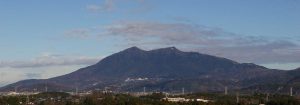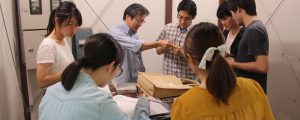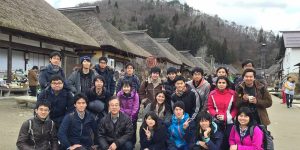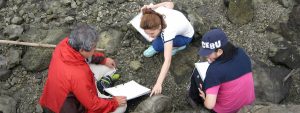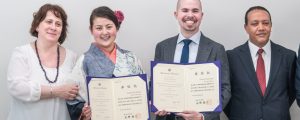Undergraduate Programs
Biology
The 21st century has been dubbed the “Century of Biology”. Technological advances have led to a revolution in our understanding of the relatedness of living organisms, and to the development of new research fields seeking to understand the processes underlying organismal development. Meanwhile, our society faces a broad range of challenges in terms of both food and fuel security. All these research areas and more can be studied in our undergraduate degree program in biological sciences. We offer an undergraduate degree program in Biological Sciences, aimed at students which hold a non-Japanese passport. Our 4-year program starts at a basic level, learning foundational subjects in biology, chemistry, and physics. In […]
Finance (Geoscience)
Planning your finances for university studies can be difficult. Your main expenses will be tuition, accommodation rent, food and living expenses, travel, and personal expenses. This page will provide information regarding financial information for students entering the English program in Geocience. Tuition fees Students entering this program will have the admission fee (282,000 yen) and tuition the first semester (267, 400 yen: Sept – Mar) waived. After this, students are expected to pay tuition – 535,800 yen per year. Admission Fee and Tuition Partial and full tuition waivers are available for high performing students with financial difficulties. Entrance Fee Exemption and Tuition Waiver Scholarships The University’s Tsukuba Scholarship is open […]
Research fields (Geoscience)
2 Fields, 12 Laboratories, 43 Professors The College of Geoscience comprises two fields of study: Geoenvironmental Sciences and Earth Evolution Sciences. Geoenvironmental Sciences explore the nature of, and processes in, the atmosphere, hydrosphere and on the Earth’s surface as well as their interaction with human and biological activities. Earth Evolution Sciences study structure, composition, history and mechanics of the Earth by quantitative geological, physical, chemical and biological methods for forecasting the future. Each field has 6 labs, and most labs have multiple professors. The total number of academic staff members is 43. Geoenvironmental Sciences Atmospheric Science Research is conducted on various weather and climate phenomena that occur on regional to global scale. Research is […]
Japanese Program (Geoscience)
Basic Structure of Japanese Program Students in Japanese program generally enter in April (October admission is also available) of their first year and complete six semesters of taught courses. The final year is mainly reserved for a research project resulting in a mandatory graduation thesis. The educational program allows students to overview diverse fields of geoscience. Students learn concepts, ideas and techniques of geoscience through a variety of course types. Students are required to complete 124 credits mainly as lectures along with field work courses, seminars, and other course types. One lecture credit represents 10 lectures, with each lecture being 75 minutes long. For each hour of class time, students […]
English Program (Geoscience)
Coursework Plan for the English Program The English educational program allows students to overview diverse fields of geoscience. Students learn concepts, ideas and techniques of geoscience through a variety of course types. Students are required to complete a minimum of 124 credits to graduate. Credits are categorized into subjects offered by a.) the School of Life and Environmental Sciences (Geoscience, Biological Sciences and Agro-Biological Resource Sciences) making up two-thirds of the credit load and b.) other Schools as “General Foundation Subjects” for the other third. One lecture credit represents 10 lectures, with each lecture being 75 minutes long. For each hour of class time, students are expected to complete 3 hours […]
Why study Geoscience in Japan?
Why Geoscience in Japan? Disaster-Prone Country in Need of Geoscience Japan is well known for its unique culture that combines tradition, nature and technology. This mountainous island country is located on an active margin with limited area suitable for agricultural, indstrial or residential use and possess limited natural resources. The forces of nature have attacked the human society of Japan throughout its history as natural disasters, for example, earthquakes, tsunamis, volcanic eruptions, typhoons/heavy rainstroms and associated floods, landslides, and other disaster types. Natural processes have also triggered human-related disasters such as the tsunami-induced nuclear plant accident in 2011 or coastal erosion. Such a natural and social background has required and promoted the development of […]
Geoscience
The Earth is a unique planet with full of water and life including human being, and has a history of 4.6 billion years. Environmental protection has become a global and urgent topic, and people hope to use the earth system more effectively without destroying it. The College of Geoscience offeres English and Japanese programs for Bachelor of Science in Geoscience to aquire the general knowledge and insight of the evolution of the Earth, the natural processes on the Earth, and the interactions between natural environments and human activities, which would be the basis for the development of sustainable society. English Program The University of Tsukuba is the only university in Japan offering a degree in geoscience […]
Application information (IDE)
Application information (IDE) This information page is for students who will enroll in AY2023. Information for students enrolling in AY2024 will be updated soon. August 1, 2022 Response on Admission AY 2023 to COVID-19 In recognition of the ongoing COVID-19 impacts on our prospective students, we have decided to extend its practice to make the standardized test such as SAT and ACT (to evaluate mathematic skills) listed in IDE’s Application Guidelines optional for AY 2023 applicants. All prospective students who are able to submit their scores are yet strongly encouraged to do so. However, there will be no penalty for those who are not able to submit scores. The TOEFL […]
Graduate Prospects
Career after Graduation After graduation, students have many options open to them including advancing their studies at the graduate level. In fact, 85% of undergrads proceed on to graduate school. At the University of Tsukuba you can enroll in either Graduate School of Pure and Applied Sciences, the Doctoral Program in Materials Science and the Doctoral Program in Applied Physics, all which are recognized as 21st Century Center of Excellence (COE) programs. These programs correspond to the undergraduate College of Engineering Sciences and provide the highest standards of education and produce research recognized by the engineering community. For those who wish to pursue personal careers after graduation from the Interdisciplinary […]
Curriculum
Curriculum policy To provide and implement a curriculum that emphasizes basic subjects in order to acquire solid fundamental skills in mathematics and physics, which are the basic foundation of engineering fields. Fostering core engineering knowledge and skills for a broader perspective of manufacturing from micro to macro. Enhance PBL learning approach to resolve engineering problems spontaneously and creatively. Human resource development through education in the Interdisciplinary Engineering Program To meet the demand of a sustainable and smart society for future generations, we need to confront challenges in the rapidly changing technologies and problems of the 21st century. Thus, it is necessary to pursue knowledge in various engineering fields with common […]


